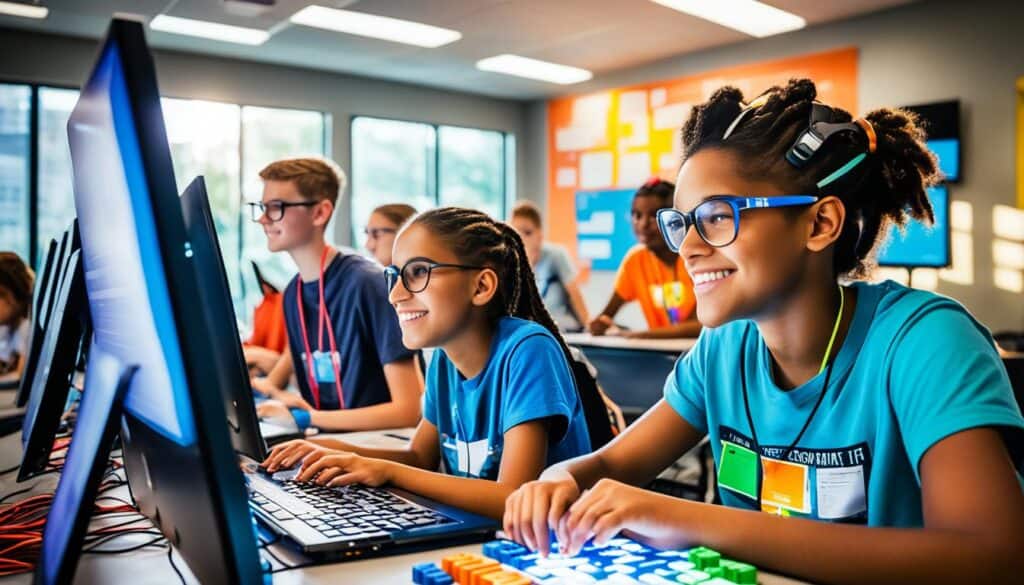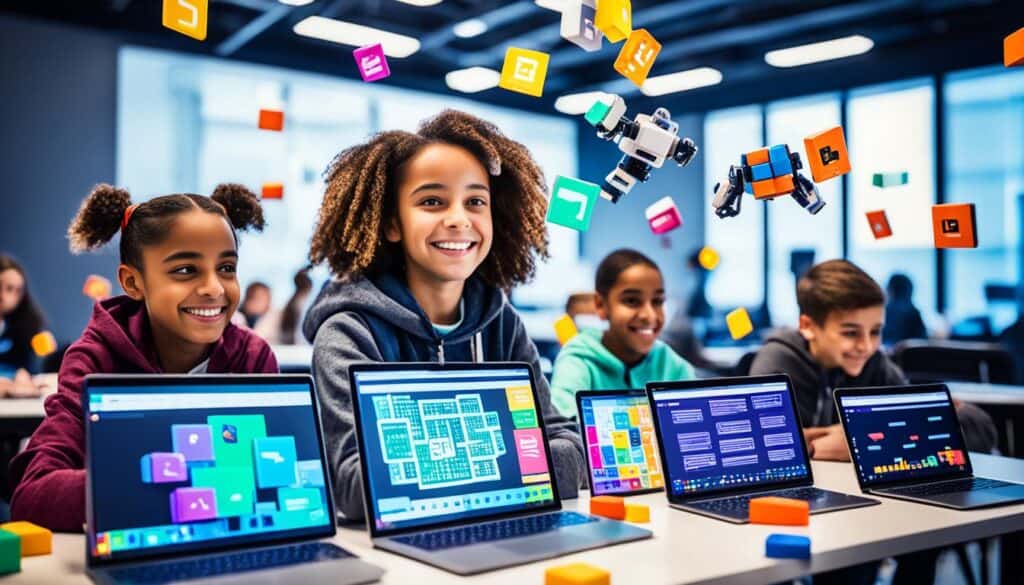Back in my day, we swapped Pokémon cards, not tackled Python or Java. But now, things are different. The interest of tweens has shifted. This is due to computer jobs growing at 12% until 2024, the Bureau of Labor Statistics reports. Hence, kids are learning coding. And with a $81,430 median salary, it’s easy to see why. Code Louisville and Stanford University Libraries now offer coding classes often.
Getting your kids into Coding Skills for Tweens seems smart, right? Diving into programming education is more than job prep. It opens up a whole new digital world. So, let’s switch mud play with debugging.
Wondering if coding and fun go together for tweens? Picture their joy as a robot stacks cups on command. It feels like a scene from science fiction. Yet, it’s real and part of adding tech skills to their life. It’s a step up from dial-up internet and old screensavers.
Key Takeaways
- Tech skills are becoming a new playground for tweens, with computational jobs growing at lightning speed.
- With salaries in the technology sector more than doubling the average, who wouldn’t want to understand a for-loop?
- Programs like Code Louisville are a beacon of hope, guiding the young ones to secure not just new jobs, but new futures.
- Treehouse badges aren’t just virtual kudos, they’re proof that kids and coding mix better than peanut butter and jelly.
- With universities and libraries jumping on the bandwagon, programming education is no longer an elective; it’s an evolution.
- Even the Portsmouth Public Library threw their hat into the ring seven years ago, teaching kids that coding is just another language – and today’s Rosetta Stone.
Unlocking Potential: How Coding Fundamentals Shape Tomorrow’s Innovators
Coding is like a secret language. Once you know it, a world of possibilities opens up. Summer camp coding programs are turning young minds into tomorrow’s innovators. Kids learn coding fundamentals there. With robots and AI around, knowing tech skills is becoming crucial. It’s as important as making a peanut butter and jelly sandwich.
At a summer camp, the excitement among the kids was clear. They weren’t just coding. They were creating the future. By solving real-world problems, these kids prove coding and problem-solving make brilliant young professionals.
- Education needs to evolve to fit new job markets, say the National Academies of Sciences.
- Labor experts highlight the unmatched value of creativity and communication skills.
- According to Pew, 87% of workers are training to stay current with technology.
- Alternative credentials highlight the importance of continuous learning.
Camps aren’t just for learning. They’re where future inventors grow. Students in Belize won the Samsung Solve for Tomorrow contest. With AI, we should aim to be its programmers, not its rivals. Coding camps are essential for staying ahead in innovation.
The future of jobs is uncertain. But one thing is clear: those skilled in tech will lead. Indonesia needs millions of tech experts by 2030. Samsung is pushing for community-improving tech. This includes devices for the visually impaired and eco-friendly innovations.
To embrace tech advancement, one must start with coding. Let’s send our kids to coding camps. They’ll learn tech skills to shape their futures. Maybe they’ll even program robots to make PB&Js for us!
The Digital Playground: Coding Applications For Tweens
Have you seen tweens dive into coding? It’s amazing. They’re like little experts writing complex code. Coding is now a big deal in schools. Over 210 schools are teaching it. This means 13,000 teachers are helping more than 161,000 students in Montgomery County. They learn about HTML, Python, and Scratch. This turns traditional learning into fun tech lessons.
Montgomery’s ignITe Hub is super exciting. Tweens here don’t just play games like Minecraft. They learn to build like pros. It’s like their first step into the tech world. They even learn how this can lead to making $91,250 a year. This info is from the Bureau of Labor Statistics.
Coding wizards start young, thanks to Code.org. Even at five, kids are creating with tech. They’re ready for a growing industry. Khan Academy and Codecademy offer free lessons. You can also try Tynker or CodeMonkey for a small fee.
Dr. Monifa B. McKnight is making school cool. Coding links kids to internships and real jobs. It’s not just a trend. It’s our future. And Gameblox? It lets gamers build their own worlds. They create, change, and play their games. It’s all done with coding.
Coding for tweens is more than just screen time. It teaches problem-solving through games. Kids learn to code in fun ways. They’re preparing for a future where tech and creativity meet. So let’s encourage them to code. It’s a skill that unlocks endless possibilities!
Coding Skills for Tweens: Paving the Way for Future Success
Imagine a classroom full of excitement instead of groans. Here, a pyramid of cups stands tall, thanks to coding. It’s not a sport, it’s the cool coding club. Learning in-demand tech skills is now a must, not just extra. Third graders move cups by coding, all thanks to Sarah Burns at Western Hills Elementary.
Coding might make you think of “The Matrix”. But it’s actually full of color and creativity. Programming education turns kids into modern-day wizards. AI is changing everything, from healthcare to what you binge-watch on Netflix. Coding is at the heart of it all.
- In healthcare, AI spots problems super fast. Faster than googling my own symptoms.
- My love for fantasy football actually makes sense now. Sports analytics change how teams like the Houston Rockets play.
- Ever wondered how banks fight fraud so quickly? It’s all those data skills at work.
But there’s more to coding than just work. Netflix’s AI knows I love odd documentaries. Cars are driving themselves, thanks to Tesla and Wymo. And AI is making everyone an artist, no messy overalls needed.
- Gaming just got tougher with smarter AI opponents. Exactly what my game nights needed!
- Coding teaches kids great skills like teamwork, communication, and never giving up. Who knew video games were so educational?
Worried about your child’s screen time? Real coding projects help them shine. They’re not just coding; they’re leading in the digital world. They’re gearing up for big things in the future.
Navigating Programming Education: Choosing the Right Path for Your Child
As parents, we want to give our kids the best start in education. Thinking about programming education for our digital-native kids is important. They’re probably better at tech than us already. The world is interconnected like a web. So, choosing the right programming path is key.
Libraries used to be about quiet and books. Now, they’re gateways to a digital world. They teach future tech geniuses. The National Teen Programming Guidelines help us find great education. They were made with feedback and strategic planning. It’s like a secret recipe for learning programming.
My tween prefers digital creation over sandcastles. Enrolling them in a summer camp coding program seemed perfect. These camps focus on creation and teamwork with coding. Kids get to be creators in their digital worlds. This is the new way to play and learn.
- Libraries now focus on tech skills.
- We need print, digital, and media literacies, plus leadership and critical thinking.
- There are many learning opportunities available.
A good education needs the right mix. We need teen-led programs and interest-based activities. We also need curious and engaged students. Our goal is a generation ready to lead and innovate.
Coding strengthens the brain’s executive functions. It helps kids plan and focus better. Just 1 month of coding can hugely benefit their minds.
Finding the best programming education is like choosing from a buffet. You want options that are good for your child’s brain. It’s about picking the right choices for their future.
There are many paths, from coding boot camps to college programs. Coding skills can lead to great future job opportunities.
- Young kids learn tech through stories and play.
- Older kids tackle algorithms and complex ideas.
- There’s fitting coding language for every stage.
In the end, our goal is to support our kids’ growth, no matter their path. It’s all about the learning journey. Let’s prepare them for this adventure in programming education. It’s a journey definitely worth taking!
Conclusion
Sitting on the edge of my chair, I think about our bright young generation. It’s amazing how kids today use technology so easily. Teaching them Coding Skills for Tweens is very important. Sarah Burns and her third-grade friends in Arkansas show us this. They’re not just learning to code. They’re becoming future tech leaders.
Through my computer screen, I’ve seen how code.org makes coding fun. Kids play with PyCharm and Visual Studio like they’re toys. This isn’t just for fun. It lets kids turn their dreams into real programs.
In my house, everyone wants more time with gadgets. But think about it. With so many easy and free ways to learn coding, we should appreciate our kids’ abilities more. We don’t want too much screen time. Yet, if screen time means kids are creating with code, we should support it. By encouraging this now, we’re helping our kids onto the path of innovation.



